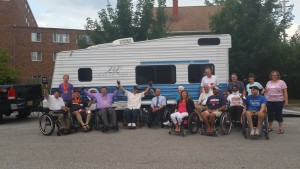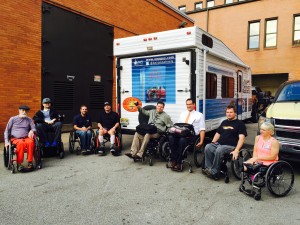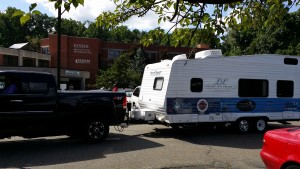Archive for Education & Training Resources
MetroHealth Cleveland: Quadriplegic Cross-Country Speaking Tour
Posted by: | CommentsWhat a privilege it was once again to present to such an inspiring group. We visited MetroHealth Rehabilitation Hospitalin Cleveland. 8/17/15. One of the things that really motivates me to give these presentations is when someone reacts like one of the audience members last night. He said “I received a spinal cord injury about 30 days ago. This is all new and scary to me. Your presentation helped to inspire me to continue working hard for 4 hours a day to try to improve my strength and independence. Thank you for coming out and speaking to our group.” Wow! What an impact that have for me every time I hear it.
University of Pittsburgh Medical Center Mercy Hospital Presentation
Posted by: | CommentsUniversity of Pittsburgh Medical Center Mercy Hospital PresentationQuadriplegic Cross-Country Speaking Tourhttps://www.youtube.com/watch?v=wU3QJtw623YOn August 6, 2015 I had the pleasure to present to an inspirational group at University of Pittsburgh Medical Center Mercy Hospital. The Quadriplegic Cross Country Speaking Tour, began on July 23rd and there were several presentations within my home state of New Jersey. Following two great presentations, one at Kessler Rehabilitation Hospital and the other for the New Jersey State Chamber of Commerce foundation, Charles Fleisher and the cross-country speaking tour got underway. On August 6, we arrived at the hospital towing our 20-foot handicap-accessible trailer. I was blessed to be able to tow my 2013 GMC Sierra pickup truck. It was converted for handicap use by two of my major sponsors. Ryno Mobility in Pinellas Park Florida and Drive Master Corporation in Fairfield New Jersey.
Thank you to all of my sponsors for the support we received. Upon arriving at the hospital we were shown into a back loading area to park the pickup truck and trailer. Lee Tempest, a program coordinator on the spinal cord unit at UMPC Mercy Hospital was there and guided us. He then showed us into the hospital and gave us a quick tour of the rehab and spinal cord injury facilities. University of Pittsburgh Medical Center Mercy Hospital is a beautiful facility. It’s specialty is spinal cord injuries and rehab in general. It’s part of the much larger University Of Pittsburgh Medical Center system.My projector and laptop were quickly setup and we were introduced to many of the audience members . The level of injury and experience with spinal cord injuries varied greatly. Some of the audience have been injured for 20 years and others for only a few months. It was inspiring to see how all of these individuals are moving forward and dealing with their new challenges. I spoke with Michael who has a farm and just purchased a brand-new truck. We spoke about options he might have to convert it for wheelchair accessible.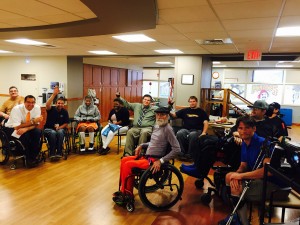
quadriplegic cross-country speaking tour inside University of Pittsburgh Medical Ctr., Mercy Hospital
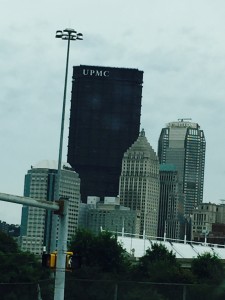
Quadriplegic Cross-Country Hospital Speaking Tour
Posted by: | CommentsHello,We need your help, support excitement and interest.It’s time for me to pay it forward in return for all the help I received after a spinal cord injury at age 18. There are thousands of people in the US and abroad with injuries who will benefit from what I’ve learned over the last 25 years thriving with a spinal cord injury. It’s time for me to share this experience and guide as many of them as possible through this challenging time in their lives.”
This Summer, on behalf of a Beyond Wheels, a nonprofit to promote sports, recreation and employment for people with disabilities, we’ll be visiting a minimum of nine SCI rehab hospitals and events.I’m driving a truck adapted by Ryno Mobility and DriveMaster Corp. and pulling a 20 foot trailer converted for wheelchair access travel.Please help by making a contribution and by sharing our adventure on your social media. We’ve already started a crowdsourcing fundraising campaign on IndieGogo which began August 3. We’ve surpassed 25% of our $5000 goal within in the 1st week but we need your participation to keep the momentum going.Please share this adventure through any and all of your social media connections. Including email, Facebook, twitter, YouTube and Instagraham. All of the platforms you love and enjoy. The IndieGogo site will allow you to get involved, contribute and share.
Imagine how your support will help someone through the trials and tribulations of a devastating injury. Your contribution will allow people with injuries to see how full their lives can be living with a spinal cord injury. It will show them how they might still drive a 4 x 4 truck, skydive, ski or go white water rafting. It will show them how they might travel the world. It will provide them with a positive view to the future! You can help us do these things.For those of you who are already living a full and successful life after an injury, remember the messages, mentors and support that helped you get there.We can easily be found, followed and shared in the following places:Click Here to Contribute Via Our Fundraising Websitehttp://igg.me/at/quadtour/x/11425549Website http://www.beyondwheels.org/Twitter https://twitter.com/beyondwheelsFacebook https://www.facebook.com/pages/Beyond-Wheels/644301052272728YouTube https://www.youtube.com/channel/UCcXWSVJ_sX2arDgLIArGaQwPhone 732-895-2610Click Here to Contribute Via Our Fundraising Websitehttp://igg.me/at/quadtour/x/11425549Where it all began:
It’s early on a bright warm summer morning just outside of Denver. I’m a young man of 19. It’s June of 1989, I’m wide-eyed and smiling from ear to ear in front of an itinerary of events. The activities include water skiing, hot air ballooning, sailing, camping, canoeing, and white water rafting. I begin to feel as if I have entered an extreme sports summer camp. I add my name to all these events and the fun begins. But I am not at an extreme summer camp. Instead, I have recently been admitted to Craig Hospital, a rehab facility for individuals with spinal cord injuries and head trauma.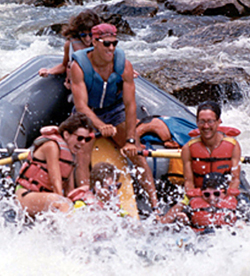
Only months before. It’s a dark night in October . The year is 1988. There are four young men. They’re 18. And there knocking back a few Budweiser’s. At midnight, one of boys has what he thinks is a brilliant idea. He says, let’s go visit Kevin at Stockton college. Freshman in search of a party. Yeah right! A brilliant idea. The passenger steps inside his dream car. It’s A white Nissan 300ZX Turbo. The driver jams his foot on the floor and the passenger is pinned back into his seat. It’s like a roller coaster. They are rocketing down the Highway at 120 miles an hour.Because they’re teenagers, they’re more thrilled than they are scared. 18-year-old geniuses. The driver slows at a toll. Once through, the passenger is once again thrown back into the seat. The passenger sits up, looks over his shoulder, and what do you think he sees? That’s right. Red white and blue police lights. What does the driver do? Slowdown? Pullover? No. That would make too much sense. He speeds up in an attempt to escape. He grabs the steering wheel and jerks it to exit the Highway. But they don’t. They don’t! The Turbo jumps a curb. It hit’s a small tree. The tree collapses. The Turbo flips over and since the passenger Charles is not wearing a seatbelt, He’s ejected from the vehicle, thrown wildly through the air 100 feet. His neck breaks! He’s hit with a permit spinal cord injury. Yes! I was the passenger on that tragic night.The rehab process, from the time of my accident, and through long years is long hard work, but gradually I come by answers. By the time I finish SCI rehab, I have a new awareness and new tools to deal with my life altering injury. Most importantly I now no that the glass is still more than half full and that despite the new physical considerations, there are still incredible opportunities available to to myself and people with similar injuries. The new restrictions are significant, but with the help of giant hearted individuals and incredible programs, there is enough to keep most people with injuries busy and fulfilled for many lifetimes. This Indiegogo campaign is inspired by what myself and others has learned. It’s inspired by the desire to pass it on and help others.The accident creates all kinds of challenges. How will I take care of myself? How will I get a job? How will I even motivate myself to get out of bed every day? But in retrospect there are incredible opportunities that came out of that terrible night. Thousands of people a year face similar “new realities.” This tour, this Indiegogo campaign, exists to help those individuals prosper under their difficult circumstances as soon as possible.The money raised will go to cover expenses for the trip. Transportation, support, promotion, and daily expenses. The money raised in the campaign will also cover inspirational materials and tools for audience members. These materials and tools will help individuals improve their learning curve while dealing with challenges related to their injuries.Please contact us and follow us:Click Here to Contribute Via Our Fundraising Websitehttp://igg.me/at/quadtour/x/11425549Website http://www.beyondwheels.org/Twitter https://twitter.com/beyondwheelsFacebook https://www.facebook.com/pages/Beyond-Wheels/644301052272728YouTube https://www.youtube.com/channel/UCcXWSVJ_sX2arDgLIArGaQwPhone 732-895-2610
The Difficulties, Opportunities and Challenges of Returning to School
Posted by: | CommentsThe Difficulties, Opportunities and Challenges of Returning to SchoolA spinal cord injury and recovery from such an injury is difficult enough, but people with these injuries are instantly confronted with other challenges as well. One of those challenges is employment and education. Ron Moore has worked at Kessler hospital for years and is in the process pursuing a degree in counseling. He wants to share his experience and help others overcome challenges that he has faced. Below is an interview with Ron Moore. Hopefully you can gain inspiration and knowledge from his experience. Charles Fleisher: Tell me about your activities, interests and occupation before your injury?Ronald Moore: I was a carpenter for 12 years before my injury and started that occupation a week after graduating high school. At that time I was not interested in going to college, but when I turned 26 I stared taking night courses at Essex County College because I wanted a career change. I was taking two courses a semester. In terms of recreational activities I would go to a gym 3 to 4 times a week because I was very health conscious, I used to roller blade often and went to the beach often. I also did some skiing in the winter months but not much. Charles Fleisher: In a way you feel comfortable, please explain how your accident happen and how old were you?Ronald Moore: It was 1994 and I was 30. I was horsing around with some friends and I fell off a dock into shallow water and broke my neck.Charles Fleisher: How long did it take to go back to school and where did you start?Ron Moore: It took two years and I went back to Essex County College, then College of Staten Island due to a move to Staten Island, then Fairleigh Dickinson University due to a move back to NJ, then Rutgers Newark for graduate school and finally Montclair State for graduate school.Charles Fleisher: When did you start going to classes at a physical location?Ron Moore: 9/1996Charles Fleisher: What has your college experience been like post injury?Ron Moore: Overall it has been fine with schools and teachers making accomodations when needed.Charles Fleisher: Are you glad you went back?Ron Moore: yesCharles Fleisher: What are your goals for your education?Ron Moore: To become a certified counselor
Returning to school with the spinal cord injuryReturning to School after a Spinal Cord Injury:
Michael Rhode interview with Charles Fleisher The Opportunities Guy
Going or returning to school after a spinal cord injury can be challenging but also rewarding. After my injury in 1988 I was reluctant and intimidated by the daunting challenges of mobility, taking notes, and learning to socialize again on a college campus. Michael Rhode’s experience bears similarities to mine. In the following interview, Rhode discusses some of the challenges and benefits of his recent experience returning to the Brookdale College campus in 2013.
Interviewer (Charles Fleisher): Tell me about your activities, interests and occupation before your injury?
Rhode: I was extremely active, as a personal trainer, as well as being a fitness consultant. I loved outdoor activities, skiing, road biking, surfing, running on the beach, and hiking. I was a member of the Hunter Mtn Ski Patrol.
Fleisher: Please explain how your accident happen and how old were you?
Rhode : I was injured in a skiing accident when I was 45yrs old, while working as a Ski Patroller. My binding prematurely released, resulting in a high speed crash, which left me paralyzed from the chest down.
Fleisher: Had you gone to college or any other trades schools prior to your injury?
Rhode: I was in nursing school when the accident happened.
Fleisher: How long did it take to go back to school and where did you start?
Rhode: My accident happened in Dec of 2010, and I returned to school in Jan of 2012. I started back up at Brookdale Community College taking online courses and in the 2013 Fall Semester I started to attend classes at the Lincroft and Neptune campuses.
Fleisher: What has your college experience been like post injury?
Rhode: It’s been a great motivator, one that has kept me busy throughout my recovery. Returning to attending classes in Sept of 2013 was something that really got me back into the social atmosphere.
Fleisher: Are you glad you went back?
Rhode: Absolutely, I would have gone stir crazy without having my schoolwork to keep me busy. Although I had to change my major from Nursing to Social Work, the experience is giving me a great feeling of accomplishment.Fleisher: What are your goals for your education?
Rhode : My goal is to get my Associates Degree from Brookdale and then transfer to Rutgers to obtain my Bachelors in Social Work.
Fleisher: What would you say the biggest difference is now and are you satisfied with your progress?
Rhode : The biggest difference is the fact that I need assistance with many things, and this is something I’m still adjusting too. I was use to being the one helping people, and while I still can in some aspects, the roles have drastically changed.
Click Here for more information about education & funding for education for people with disabilities.Check out education and training resources after clicking link above.
Education and Training Resources
Posted by: | CommentsWelcome to Education and Training Resources . Feel free to provide your comments. Happy blogging
